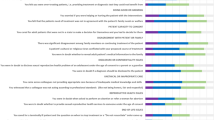Abstract
This study sought to determine cardiologists’ degrees of ethical awareness and preferred courses of action for ethical dilemmas frequently encountered in clinical settings. For this evaluation, an online survey was created and sent to cardiologists affiliated with various academic posts in Ankara, Turkey. The survey included ten cases with various ethical considerations selected from our book, “Clinic Ethics with Cases from Cardiology.” Four possible action choices were defined for each case. Participants were asked to choose one or more of these preferences. In addition, a fictional change was made in each case’s context without changing the original ethical issue, and participants were asked whether an attitude different from the first chosen one was preferred. The participation ratio was 49/185 (26%), consent ratio 47/185 (25,4%), and completion ratio 44/185 (23,7%). Nine of the ten scenario changes did not change participants’ preferred action. For most questions, action preferences were concentrated between the two options. Although legal regulations did not reduce ethical dilemmas, they clarified physicians’ action preferences. Similarly, as an obscure moral issue gained prominence, physicians were forced to draw clearer lines in their actions. External factors such as healthcare emergencies can change physicians’ ethical dilemma-solving attitudes.
Similar content being viewed by others
References
Kadıoğlu, F. G., Can, R., Okuyaz, S., Yalçın, S., & Kadıoğlu, N. S. (2011). Physicians’ attitudes toward clinical ethics consultation: A research study from Turkey. Turkish Journal of Medical Sciences, 41(6), 1081–1090.
Demir, M., & Büken, Ö. N. (2016). Proposal for a hospital ethics committee at the Hacettepe University Hospital, Turkey: A mixed method study. Acta Medica Anatolia, 4(1), 21–31.
Hurst, S. A., Perrier, A., Pegoraro, R., et al. (2007). Ethical difficulties in clinical practice: Experiences of European doctors. Journal of Medical Ethics, 33(1), 51–57. https://doi.org/10.1136/jme.2005.014266.
Ekmekci, P. E., Buruk, B., Celebi, A. S., et al. (2022). Clinical ethics with cases from cardiology. TOBB ETU Publications.
Republic of Turkey Ministry of Health (RTMH). Activity Report. Retrieved October 15 (2022). from https://sgb.saglik.gov.tr/TR-87502/tc-saglik-bakanligi-2021-yili-faaliyet-raporu-yayinlanmistir.html.
Boceta, R., Martínez-Casares, O., & Albert, M. (2021). The informed consent in the mature minor: Understanding and decision-making capacity. Anales De Pediatria (Engl Ed), 95(6), 413–422. https://doi.org/10.1016/j.anpede.2020.10.011.
Turkish Personal Data Protection Law. Law Number: 6698, acceptance Date: March 24, 2016. Retrieved November 10 (2023). from https://www.mevzuat.gov.tr/mevzuat?MevzuatNo=6698&MevzuatTur=1&MevzuatTertip=5.
Orr, R. D., & Genesen, L. B. (1998). Medicine, ethics and religion: Rational or irrational? Journal of Medical Ethics, 24(6), 385–387. https://doi.org/10.1136/jme.24.6.385.
Barilan, Y. M. (2011). Respect for personal autonomy, human dignity, and the problems of self-directedness and botched autonomy. The Journal of Medicine and Philosophy, 36(5), 496–515. https://doi.org/10.1093/jmp/jhr035.
Sultan, H., Mansour, R., Shamieh, O., Al-Tabba’, A., & Al-Hussaini, M. (2021). DNR and COVID-19: The ethical dilemma and suggested solutions. Frontiers in Public Health, 9, 560405. https://doi.org/10.3389/fpubh.2021.560405.
Phelps, K., Regen, E., Oliver, D., McDermott, C., & Faull, C. (2017). Withdrawal of ventilation at the patient’s request in MND: A retrospective exploration of the ethical and legal issues that have arisen for doctors in the UK. BMJ Support and Palliative Care, 7(2), 189–196. https://doi.org/10.1136/bmjspcare-2014-000826.
Pettersson, M., Hedström, M., & Höglund, A. T. (2020). The ethics of DNR decisions in oncology and hematology care: A qualitative study. BMC Medical Ethics, 21(1), 66. https://doi.org/10.1186/s12910-020-00508-z.
Hasan, T. T., Seyed, B. M. S., Fallahi-Khoshknab, M., Ebadi, A., Mohammadi Shahboulaghi, F., & Gillespie, M. (2018). Respecting the privacy of hospitalized patients: An integrative review. Nursing Ethics, 969733018759832, https://doi.org/10.1177/0969733018759832.
Kim, K., Han, Y., & Kim, J. S. (2017). Nurses’ and patients’ perceptions of privacy protection behaviors and information provision. Nursing Ethics, 24(5), 598–611. https://doi.org/10.1177/0969733015622059.
Karimi, R., Nayeri, N., Daneshvari, Z., et al. (2009). Comparison of nurses and adolescents understanding of the importance of patient privacy and patient compliance. Hayat, 15, 21–30.
Akyüz, E., & Erdemir, F. (2013). Surgical patients’ and nurses’ opinions and expectations about privacy in care. Nursing Ethics, 20(6), 660–671. https://doi.org/10.1177/0969733012468931.
Leonard, L. D., Cumbler, E., Schulick, R., & Tevis, S. E. (2021). From paternalistic to patient-centered: Strategies to support patients with the immediate release of medical records. The American Journal of Surgery, 222(5), 909–910. https://doi.org/10.1016/j.amjsurg.2021.04.018.
Dreisinger, N., & Zapolsky, N. (2018). Complexities of consent: Ethics in the pediatric emergency department. Pediatric Emergency Care, 34(4), 288–290. https://doi.org/10.1097/PEC.0000000000001131.
Frank, C., Holmberg, M., Jernby, E. E., Hansen, A. S., & Bremer, A. (2022). Older patients’ autonomy when cared for at emergency departments. Nursing Ethics, 29(5), 1266–1279. https://doi.org/10.1177/09697330221105637.
Author information
Authors and Affiliations
Corresponding author
Ethics declarations
Statements and Declarations
We know of no conflicts of interest associated with this publication, and there has been no financial support for this work. As the Corresponding Author, I confirm that the manuscript has been read and approved for submission by all the named authors.
Additional information
Publisher’s Note
Springer Nature remains neutral with regard to jurisdictional claims in published maps and institutional affiliations.
Rights and permissions
Springer Nature or its licensor (e.g. a society or other partner) holds exclusive rights to this article under a publishing agreement with the author(s) or other rightsholder(s); author self-archiving of the accepted manuscript version of this article is solely governed by the terms of such publishing agreement and applicable law.
About this article
Cite this article
Buruk, B., Ekmekci, P.E., Çelebi, A. et al. A Qualitative Research Survey on Cardiologist’s Ethical Stance in Cases of Moral Dilemmas in Cardiology Clinics. Health Care Anal (2024). https://doi.org/10.1007/s10728-023-00476-6
Accepted:
Published:
DOI: https://doi.org/10.1007/s10728-023-00476-6



